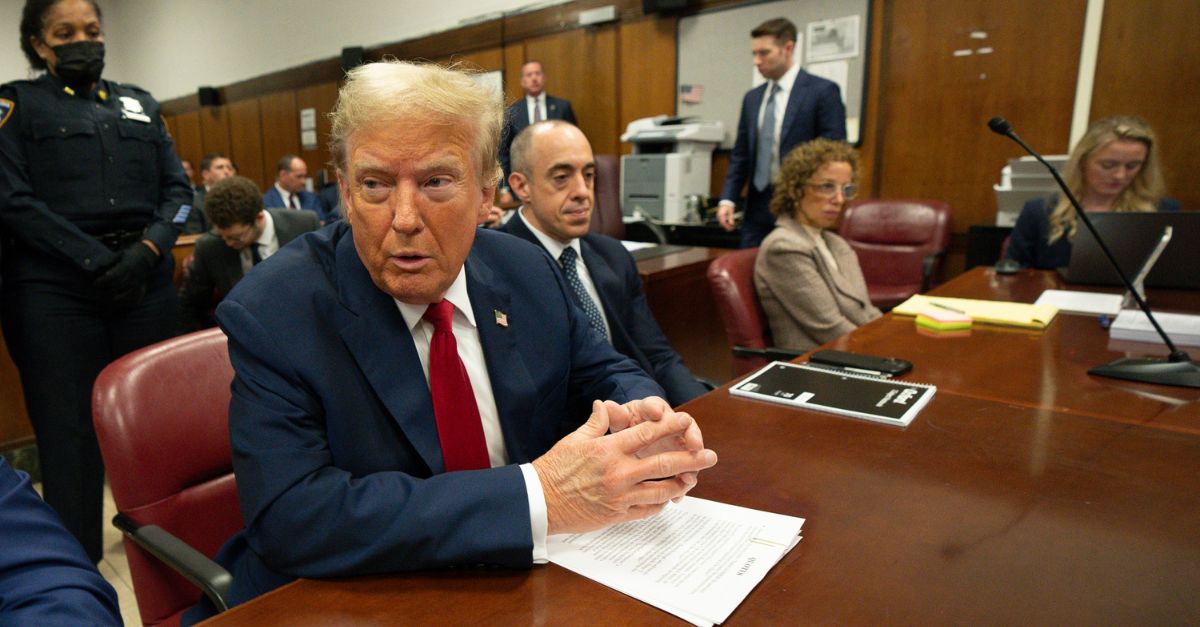
Former President Donald Trump appears at Manhattan criminal court before his trial in New York, Thursday, May 16, 2024. (Steven Hirsch/Pool Photo via AP)
What consequences should the American legal system mete out to ex-President Donald Trump for allegedly deceiving the American voters in the 2016 election which sent him to the White House by hiding past alleged affairs with two women through falsified business records? If Trump is convicted in the Manhattan criminal case, he will lose his right to vote in Florida.
Trump is the first president to be charged with any crime. Nonetheless the question of how to deal with an antidemocratic candidate in a democracy is not a new problem. As I explore in my forthcoming book, “Corporatocracy,” the question of how to deal with Trump raises the broader and older issue of what types of civil death should he be subject to.
Scholars debate the definition of “civil death.” But generally, “civil death” today typically refers to the collateral consequences of being found guilty of a crime. As the New York Court of Appeals wrote in a case from 1888: “The incident of civil death attended every attainder of treason or felony, whereby, in the language of Lord Coke, the [ ] person ‘is disabled to bring any action, for he is extra legem positus [placed outside the law], and is accounted in law civiliter mortuus [as civilly dead] [.]’”
This legal concept has long lineage. The practice of imposing “civil death” on convicted criminals in the United States comes from English Common Law, which in turn, has its roots in medieval Europe, and even dates as far back as ancient Greece. Individuals in Greece who were convicted of “infamous crimes” were denied the rights to vote, attend assemblies, or hold public office. The Greeks also prohibited these criminals from appearing in court and from serving in the military.
Ancient Greek democracy in Athens consisted of direct democracy (which was more like a Quaker meeting where the whole town of men could participate) instead of the representative democracy Americans have in the modern-day Congress. Ancient Greeks also had a practice of “ostracism” where citizens would vote a fellow Greek citizen out of Athens for 10 years. This was typically done to kick out a would-be tyrant that threatened Athenian democracy, even if the individual in question had not been convicted of a crime. As historian James Sickinger of Florida State University explained, “It was a negative popularity contest.”
The concept of “civil death” for convicted criminals morphed over space and time and eventually the ancient Greek model led to England’s legal concept of “outlawry,” which deemed an outlaw to be stripped of all rights to legally protect his life or property. The theory behind outlawry was that “[h]e who breaks the law has gone to war with the community; the community goes to war with him. It is the right and duty of every man to pursue him, to ravage his land, to burn his house, to hunt him down like a wild beast and slay him; for a wild beast he is; not merely is he a ‘friendless man,’ he is a wolf.”
John Locke wrote in his Second Treatise on Civil Government, “The Criminal” has “renounced reason, the common rule and measure God hath given to mankind … declared war against all mankind, and therefore may be destroyed as a lion or tyger, one of those wild savage beasts, with whom men can have no society nor security[.]” Or as Blackstone stated, “the criminal is no longer fit to live upon the earth, but is to be exterminated as a monster and a bane to human society.” Such reasoning about criminals was used to justify felony disenfranchisement laws which materialized as early as the 1600s in what would later become the United States.
In British Common Law civil death was even more extreme than the Greek version and included a “corruption of blood” for the descendants of certain criminals, which meant that a criminal could not leave property or titles to their heirs.
So what did the framers of the Constitution and the 14th Amendment think of civil death for criminals or those who broke democratic norms like the peaceful transfer of power? The answer is likely different for those who drafted constitutional text in 1789 and those who did so in 1868. Luckily for Trump’s children, the framers of the original 1789 U.S. Constitution rejected the British common law’s corruption of blood, even as punishment for treason. It wasn’t until 1868 when the 14th Amendment was added to the Constitution that two old Greek aspects of civil death — lack of voting rights and lack of the ability to hold public office — were added to the Constitution.
Arguably the Radical Republicans in 1868 were far more distrustful and vindictive when they framed Section 2 of the 14th Amendment which contains the Penalty Clause that punishes the 50 states with the loss of seats in Congress if they disenfranchise male citizens, but it makes an exception if the reason the voters were disenfranchised was “for participation in rebellion, or other crime.” Courts have read the Penalty Clause as permitting the old Greek practice of felony disenfranchisement in the modern United States.
Meanwhile, Section 3 of the 14th Amendment adds the punishment of not holding public office if an individual swears to the uphold the Constitution and then either “engaged in insurrection or rebellion …, or [has] given aid or comfort to the enemies thereof.” It’s this part of the Constitution that the U.S. Supreme Court interpreted in the recent case of Trump v. Anderson. Section 3 of the 14th Amendment brings back an ancient type of civil death: the inability to hold public office in a democracy under certain circumstances.
America is an outlier in taking a person’s right to vote away upon conviction for a crime. In most Western democracies, prisoners still have the franchise while they are in prison. Vermont and Maine are states that act like the rest of the world’s mature democracies. In these states, prisoners retain voting rights while incarcerated. In 2021, Washington, D.C., followed suit. But for the remaining 48 states, including Florida and New York, individuals lose their right to vote while incarcerated.
There’s nothing in the Constitution that stops a convict from running for the presidency. Because of the Anderson case, Trump’s name will be on the ballot in all 50 states. But if Trump is convicted in New York, American voters could be faced with the strangeness of candidate Trump not being able to vote for himself because the collateral consequences of felony conviction is the loss of voting rights.
Another oddity is the fact Trump could still run for office and could even run while incarcerated. America already had a mini version of that in Florida. A candidate in 2022, Jeremy Brown, who was in pretrial detention for his actions at the U.S. Capitol on Jan. 6, ran for the state legislature from jail. Brown lost his election and then later he was sentenced to 7 years for his actions on Jan. 6.
If citizen Trump is convicted in Manhattan, American voters may have a power in the 2024 election candidate Trump will lack: the ability to make an electoral choice at the ballot box.
Ciara Torres-Spelliscy is a Professor of Law at Stetson, a Fellow at the Brennan Center, and the author of the forthcoming book, “Corporatocracy.”
Have a tip we should know? [email protected]







